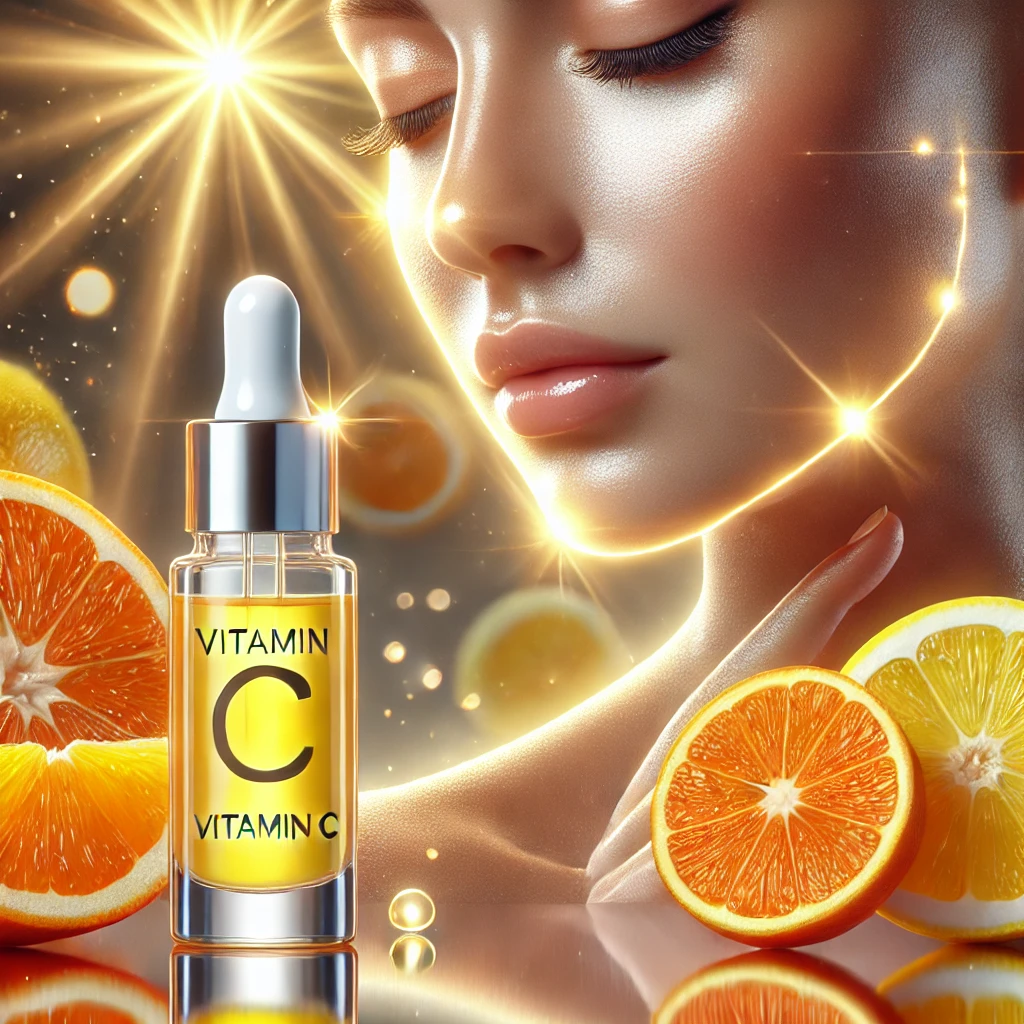Unlock Radiant Skin: The Ultimate Guide to Vitamin C and Skin Health
Vitamin C and Skin Health are intrinsically connected, with vitamin C playing a crucial role in maintaining vibrant, youthful skin.
If you’re someone who cares about maintaining vibrant, youthful skin, understanding the role of vitamin C is essential.
Vitamin C and Skin Health are closely linked, as this powerful antioxidant offers numerous benefits that can significantly enhance your skincare routine.
For many people, vitamin C is a staple in their daily regimen, thanks to its ability to protect against free radicals and boost collagen production.
This results in firmer, more elastic skin and a reduction in visible signs of aging.
In some cases, people struggle with dark spots and uneven skin tone.
The great thing about topical vitamin C is that it helps lighten these areas, promoting a more balanced complexion.
The benefits of incorporating vitamin C into your skincare routine are undeniable.
Not only does it offer protection and repair, but it also provides a brightening effect that leaves your skin looking radiant.
You’ll find that many skincare products, like serums and creams, are specifically formulated to deliver concentrated doses of vitamin C directly to your skin.
It’s essential to compare different products and choose those that contain additional ingredients to enhance absorption and effectiveness.
Consider vitamin C as a best friend for your skin—its regular use can lead to remarkable improvements in texture, tone, and overall appearance.
What’s interesting here is how accessible these products have become, making it easier than ever to include vitamin C in your daily routine.
By understanding and utilizing vitamin C, you’re taking a significant step towards healthier, more beautiful skin.
The Role of Vitamin C in Skin Health
When it comes to maintaining radiant skin, vitamin C is a game-changer.
It offers numerous benefits that promote a youthful appearance. Vitamin C and skin health are deeply interconnected.
This potent antioxidant protects against free radicals.
These free radicals cause premature aging.
For many people, including vitamin C in their skincare routine helps shield the skin from damage.
It enhances collagen production, resulting in firmer, more elastic skin.
Topical vitamin C benefits are even more pronounced.
It is especially helpful for those struggling with dark spots or hyperpigmentation.
Vitamin C helps lighten these areas for a more even skin tone.
Incorporating vitamin C into your daily routine is straightforward.
Many skincare products like serums and creams are formulated to deliver concentrated doses directly to your skin.
By comparing products with varying concentrations of vitamin C, you can find those that offer additional ingredients to enhance absorption and effectiveness.
In conclusion, the importance of vitamin C for healthy skin cannot be overstated.
Regular use, whether through diet or topical applications, ensures your skin remains youthful and vibrant.
Remember, consistency is key to reaping the full benefits of this remarkable nutrient.
For many people, maintaining a happy relationship feels like a challenge.
What’s interesting here is that the key often lies in the ten daily habits of happy couples.
Antioxidant Properties: How Vitamin C Protects Your Skin?: Vitamin C and Skin Health
When it comes to skin health, the antioxidant benefits of vitamin C are unparalleled.
Vitamin C and Skin Health are deeply intertwined, thanks to vitamin C’s powerful ability to neutralize free radicals.
For many people, free radicals are the primary cause of premature aging and skin damage.
Protecting skin from free radicals with vitamin C is essential because these unstable molecules can lead to wrinkles, fine lines, and dullness.
By incorporating vitamin C into your skincare routine, you’ll find that your skin looks brighter and more youthful.
UV protection with vitamin C is another significant benefit.
While sunscreen is crucial, vitamin C provides an extra layer of defense against UV radiation.
In some cases, applying vitamin C serum before sunscreen can enhance the overall protective effects.
The great thing about vitamin C is its versatility.
It can be found in serums, creams, and even masks, making it easy to include in any skincare regimen.
What’s interesting here is how vitamin C works at a cellular level?
It boosts collagen production, which is vital for maintaining skin’s elasticity and firmness.
If you’re someone who struggles with dark spots or an uneven skin tone, vitamin C can help lighten these areas, giving your skin a more uniform appearance.
In conclusion, the antioxidant properties of vitamin C play a crucial role in Vitamin C and Skin Health.
By regularly using products containing this powerful nutrient, you can effectively protect your skin from damage and keep it looking vibrant and healthy.
Remember, consistency is key to achieving the best results.
If you are interested in fast weight loss on diet alone, you have to plan an authentic strategy.
The Key to Glowing Skin: Vitamin C and Skin Health
For many people, Vitamin C and Skin Health are closely related because vitamin C is essential for boosting collagen production.
Collagen, a protein that maintains skin elasticity and firmness, diminishes as we age, leading to wrinkles and sagging skin.
In some cases, using vitamin C to boost collagen production can significantly improve skin’s youthful appearance.
This powerful antioxidant helps neutralize free radicals that damage skin cells, further promoting a healthy complexion.
What’s interesting here is that the role of collagen in youthful skin cannot be overstated.
It provides the structure and support that keeps skin smooth and firm.
You’ll find that incorporating Vitamin C and Skin Health products into your daily routine can help replenish collagen levels.
This enhances the skin’s elasticity and firmness.
The great thing about using topical vitamin C serums is that they deliver concentrated doses directly to the skin.
This makes it easier for the body to utilize this vital nutrient.
If you’re someone who wants to maintain a youthful glow, understanding the relationship between Vitamin C and Skin Health is crucial.
Regular use of vitamin C-enriched skincare products can make a noticeable difference in skin texture and appearance.
By choosing the right products and staying consistent with their application, you’ll find that your skin looks firmer.
Your skin will also be more elastic. Additionally, it will appear more radiant over time.
In conclusion, the key to glowing skin lies in the synergy between vitamin C and collagen production.
This ensures that your skin remains vibrant and youthful.
Brightening and Evening Skin Tone
When it comes to Vitamin C and skin health, this powerful antioxidant is essential.
It helps achieve a brighter, more even complexion.
For many people, hyperpigmentation is a persistent concern.
Dark spots and uneven skin tone are common issues.
Vitamin C for hyperpigmentation treatment is highly effective.
It inhibits melanin production, which helps fade dark spots naturally over time.
Regular use of topical Vitamin C can lead to significant improvements.
It enhances skin clarity and brightness.
If you struggle with uneven skin tone, Vitamin C can help.
Incorporating it into your daily routine makes a noticeable difference.
The great thing about Vitamin C is its versatility.
You’ll find it in serums, creams, and cleansers. This makes it easy to add to any skincare regimen.
What’s interesting is how Vitamin C reduces hyperpigmentation.
It also promotes overall skin health. Vitamin C protects against environmental damage.
It stimulates collagen production. This dual action ensures your skin stays youthful and resilient.
For enhanced effectiveness, combine Vitamin C with other ingredients. Hyaluronic acid and Vitamin E are great options.
In conclusion, Vitamin C and skin health go hand-in-hand. It helps achieve a radiant, even-toned complexion.
Using Vitamin C for hyperpigmentation treatment is beneficial.
It fades dark spots naturally while brightening your skin tone.
Consistent use will help you maintain a healthy, glowing complexion. You’ll love showing off your radiant skin.
Ylang Ylang essential oil is beneficial in enhancing skin health, removing acne, and helping to cure skin conditions due to its germ-free, antibacterial, anti-inflammatory anti-seborrheic qualities.
Vitamin C and Hydration: How to Keep Your Skin Moisturized
Exploring the connection between vitamin C and skin hydration reveals that Vitamin C and Skin Health are closely linked.
Vitamin C is essential for collagen production, which helps maintain the skin’s elasticity and firmness.
For many people, hydrating skin with vitamin C can also enhance moisture retention.
If you’re someone who struggles with dry skin, incorporating vitamin C into your routine is a great way to boost hydration levels.
In some cases, using vitamin C for dry skin care can be especially beneficial.
The antioxidant properties of vitamin C protect the skin from free radicals, which can cause dryness and damage.
The great thing about vitamin C is that it supports the skin barrier, helping to lock in moisture and keep your skin looking fresh and hydrated.
To maximize the benefits, consider the best vitamin C serums for hydration.
These serums often combine vitamin C with other hydrating ingredients like hyaluronic acid, making them more effective.
When applying a vitamin C serum, you’ll find that it absorbs quickly, providing an immediate hydration boost and leaving your skin feeling smooth.
For a practical approach, start by cleansing your face and then applying a vitamin C serum followed by a moisturizer to seal in the benefits.
Additionally, you can incorporate foods rich in vitamin C into your diet to support skin health from the inside out.
Overall, Vitamin C and Skin Health go hand in hand, and by using the right products and maintaining a consistent routine, you can achieve well-hydrated, glowing skin.
Remember, the key is to stay consistent and choose products that cater specifically to your skin type and needs.
The Anti-Aging Benefits
When it comes to maintaining youthful skin, the benefits of vitamin C are unparalleled.
Vitamin C and Skin Health are closely linked due to vitamin C’s powerful antioxidant properties.
For many people, incorporating vitamin C into their skincare routine can significantly reduce the appearance of fine lines, wrinkles, and age spots.
This is because vitamin C boosts collagen production, which is essential for maintaining skin elasticity and firmness.
If you’re someone who struggles with early signs of aging, anti-aging skincare with vitamin C can be a game-changer.
The great thing about this nutrient is its ability to neutralize free radicals, thus preventing further skin damage.
Vitamin C for reducing fine lines promotes the skin’s natural regeneration process, helping your body repair damaged skin cells.
In some cases, people find that wrinkle prevention with vitamin C is most effective with serums.
These serums deliver a concentrated dose directly to the skin.
What’s interesting is that consistent use of vitamin C can help lighten dark spots. This creates a more even skin tone.
Examining these anti-aging properties shows why vitamin C is a cornerstone in many skincare routines.
You’ll find that using products rich in vitamin C helps reduce visible signs of aging. It also enhances overall skin health.
This makes your skin look more radiant and youthful.
In conclusion, the benefits of vitamin C for anti-aging are extensive.
Incorporating it into your skincare regimen is a practical step. It leads to healthier, younger-looking skin.
World of hair care has recently discovered that Rosemary oil is best for hair growth. The benefits of using the oil for hair growth can be seen in stopping hair loss.
Vitamin C and Skin Conditions: Can It Help with Acne, Rosacea, and More?
For many people, Vitamin C and Skin Health are synonymous with clear, radiant skin.
But did you know that vitamin C can also help manage various skin conditions like acne, rosacea, and eczema?
The great thing about vitamin C is its ability to reduce inflammation and promote healing, making it a valuable tool for those with sensitive or problematic skin.
Vitamin C benefits for acne-prone skin include its antioxidant properties, which help combat free radicals and reduce inflammation.
This can result in fewer breakouts and a reduction in acne scars.
If you’re someone struggling with rosacea, managing rosacea with vitamin C might be beneficial.
Vitamin C’s anti-inflammatory properties can soothe redness and irritation, providing much-needed relief.
In some cases, vitamin C for soothing sensitive skin can be a game-changer.
Its gentle nature helps reduce irritation and supports the skin’s barrier, which is essential for those dealing with conditions like eczema.
You’ll find that incorporating vitamin C into your skincare routine is straightforward, with many products available in the form of serums and creams.
What’s interesting here is that the benefits of vitamin C extend beyond just treating specific conditions.
It also promotes overall skin health by boosting collagen production and protecting against UV damage.
By understanding the broad benefits of vitamin C and how it can address various skin concerns, you can make informed decisions about your skincare routine.
Remember, consistency is key, and with regular use, vitamin C can help you achieve healthier, more vibrant skin.
How to Incorporate it into Your Daily Routine?
Incorporating vitamin C into your skincare routine can significantly enhance your skin’s health and appearance.
Vitamin C and Skin Health go hand in hand, offering numerous benefits such as brightening your complexion and reducing signs of aging.
To effectively include vitamin C in your daily routine, start with a gentle cleanser to prepare your skin.
After cleansing, apply a vitamin C serum, which is one of the best ways to use vitamin C products due to its high concentration.
For many people, this step is crucial for allowing the skin to absorb the nutrients fully.
Next, follow with a moisturizer to lock in the benefits.
Adding vitamin C to daily skincare helps in shielding your skin from free radicals, thereby preventing damage.
Skincare routine tips with vitamin C include using the serum in the morning to maximize its antioxidant properties against UV rays.
In some cases, you may prefer a night application if your skin is sensitive.
You’ll find that using products with complementary ingredients, like hyaluronic acid, enhances hydration and effectiveness.
The great thing about vitamin C is its versatility; it can be incorporated into any skincare regimen easily.
If you’re someone who is new to vitamin C, start with a lower concentration to gauge your skin’s reaction.
Gradually, you can increase the strength.
What’s interesting here is that consistent use over time yields the best results.
By following these tips, you’ll soon notice a significant improvement in your skin’s health and vitality, truly showcasing the power of vitamin C and skin health.
With environmental concerns on the rise, many people are seeking ways to reduce their ecological footprint.
One effective method is by using eco-friendly products.
Serum vs. Moisturizer: Which Is Better?
When deciding between a vitamin C serum and a moisturizer for your skincare routine, it’s essential to understand the benefits of each.
Vitamin C and Skin Health are closely linked, making both options viable for enhancing your skin’s radiance.
Vitamin C serums are highly concentrated, delivering potent doses of the antioxidant directly to the skin.
This leads to faster results in reducing dark spots and boosting collagen production.
On the other hand, vitamin C moisturizers combine hydration with antioxidant benefits, making them ideal for those with dry or sensitive skin who need extra moisture.
For many people, the choice depends on their skin type and specific needs.
In some cases, those with oily or combination skin may prefer serums for their lightweight, non-greasy feel.
If you’re someone who struggles with severe dryness, a moisturizer might be the better option.
The great thing about both products is their ability to improve skin health.
Vitamin C and Skin Health go hand-in-hand, whether you opt for a serum or a moisturizer.
Choosing the right vitamin C product involves considering your skin’s unique needs.
The benefits of vitamin C serums over moisturizers include higher potency and faster absorption.
However, moisturizers provide a dual benefit of hydration and antioxidant protection.
Vitamin C and Skin Health are greatly enhanced by using either product, but finding the right balance for your skin type will yield the best results.
In conclusion, whether you choose a serum or a moisturizer, integrating vitamin C into your skincare routine is a smart move for glowing, healthy skin.
Maximizing the Benefits of Vitamin C and Skin Health
Maximizing the benefits of vitamin C for skin health involves a few key strategies to ensure optimal results.
Vitamin C and Skin Health are closely linked, with vitamin C known for its antioxidant properties that protect against free radicals.
To harness these benefits, it’s important to follow some practical tips and precautions.
For many people, using a vitamin C serum daily can significantly enhance their skin’s appearance.
Tips for applying vitamin C serum include applying it after cleansing and before moisturizing to allow full absorption.
In some cases, starting with a lower concentration and gradually increasing it helps to avoid irritation.
If you’re someone who uses multiple skincare products, be mindful of potential interactions of vitamin C with other skincare ingredients.
For instance, combining vitamin C with niacinamide or retinol can sometimes reduce its effectiveness.
The great thing about vitamin C serums is their versatility, but always perform a patch test to ensure safe usage of vitamin C skincare products.
Sustainable fashion brands are revolutionizing the industry by prioritizing eco-friendly materials and ethical production practices.
Moreover, consider the dosage. A concentration between 10-20% is generally effective and safe.
What’s interesting here is that higher concentrations don’t always mean better results and can cause irritation.
For many people, consistency is key. Regular, daily use maximizes benefits.
Also, store your vitamin C products in a cool, dark place to prevent oxidation.
By understanding these tips and precautions, you’ll find that integrating vitamin C into your skincare routine can significantly improve your skin health, making it more radiant and youthful.
Remember, balanced use and awareness of product interactions are crucial for the best outcomes.
To Sum Up
In conclusion, understanding the importance of Vitamin C and Skin Health is crucial for anyone looking to improve their skincare routine.
For many people, the benefits of vitamin C are evident in its ability to promote collagen production and reduce the appearance of fine lines.
If you’re someone who struggles with dull skin, incorporating vitamin C can provide a noticeable boost in radiance.
The great thing about using vitamin C is its versatility; you’ll find that it works well with other skincare products and routines.
In some cases, individuals have reported significant improvements in skin texture and tone after regular use.
What’s interesting here is the growing body of research supporting these benefits, making it clear that Vitamin C and Skin Health are intrinsically linked.
By consistently including vitamin C in your skincare regimen, you can ensure your skin remains healthy, youthful, and vibrant.
By consistently implementing “money-saving tips,” individuals not only bolster their savings but also build a safety net for unexpected challenges.








